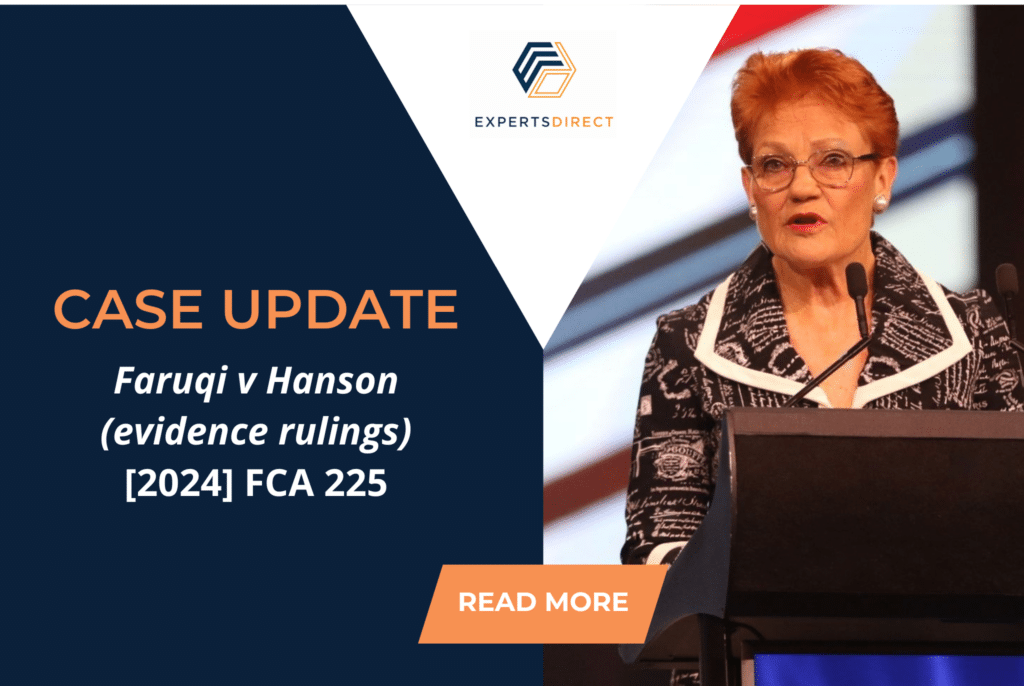Faruqi v Hanson (evidence rulings) [2024] FCA 225
Background
Senator Mehreen Faruqi published a tweet in response to the death of Queen Elizabeth II in September 2022 as follows:
Condolences to those who knew the Queen.
I cannot mourn the leader of a racist empire built on stolen lives, land and wealth of colonised peoples.
We are reminded of the urgency of Treaty with First Nations, justice & reparations for British colonies & becoming a republic.
Replying to the above tweet, Senator Pauline Hanson published a tweet as follows:
Your attitude appalls and disgusts me. When you immigrated to Australia you took every advantage of this country. You took citizenship, bought multiple homes, and a job in a parliament. It’s clear you’re not happy, so pack your bags and piss off back to Pakistan. – PH
Senator Faruqi made a complaint about Senator Hanson’s tweet to the Australian Human Rights Commission. When Senator Hanson declined to participate in that process, the complaint was terminated, enabling Senator Faruqi to pursue her claim in the Federal Court. Senator Faruqi claims that Senator Hanson engaged in unlawful offensive behaviour because of race, colour, or national or ethnic origin under Pt IIA of the Racial Discrimination Act 1975 (Cth).
Expert evidence
Senator Faruqi intends to rely on the expert report of A/Prof. JW, who has a PhD in Composition and Cultural Rhetoric, whose areas of research focus on political and legal rhetoric, and more specifically on how politicians and news media use repetitive phrases and memes to impact public opinion and voting practices.
A/Prof. JW expressed the opinion that the phrase “go back to where you came from” has stood in for anti-immigrant sentiment, and that Senator Hanson’s tweet illustrates how immigrants are either acceptable or dangerous in Australian multiculturalism.
Senator Hanson challenged the admissibility of A/Prof. JW’s report based on: parliamentary privilege, the evidence not being based on specialised knowledge, and the probative value of the evidence is outweighed by its being prejudicial, misleading, and a waste of time.
As to parliamentary privilege, the court held that deletions from A/Prof. JW’s report have sought to remove any reliance on anything stated or done by Senator Hanson in Parliament.[71]
The court was satisfied that A/Prof. JW has specialised knowledge based on her study and experience in political and legal rhetoric, and that she has the requisite specialised knowledge to express the opinions that she expresses in her report, having taught and published extensively in the area. Likewise, the court acknowledged that rhetoric is a legitimate and recognised area of specialised knowledge and expertise.[77]
Senator Hanson objected to A/Prof. JW’s evidence with respect to her state of mind, but the court did not consider that A/Prof. JW intended to give any evidence on this topic. It was found that in the section of her report where she draws on Senator Hanson’s public statements as matters of historical record, A/Prof. JW does so for the purpose of contextualising the likely understanding and impact of Senator Hanson’s tweet in Australia.[81] To the extent that any particular sentence in A/Prof. JW’s report addresses Senator Hanson’s state of mind, the court accepted that A/Prof. JW is not in a position to give evidence on that matter.[82]
The court rejected Senator Hanson’s claim that A/Prof. JW’s report is of very little probative value. Also, the court did not accept that Senator Hanson will be prejudiced in the conduct of her case by being restricted in the way in which her counsel can cross-examine A/Prof. JW about parts of her report that have been deleted because of parliamentary privilege.[87]
Senator Hanson also challenged Senator Faruqi’s intention to rely on the expert reports of Prof. KR, social psychologist, and Prof. YP, social epidemiologist, based on, among others, the limited utility of the evidence is allegedly outweighed by its impact on the trial and unfair prejudice to Senator Hanson. In particular, Senator Hanson submits that the scholarly material provided with Prof. YP’s report (1410 pages) is unduly burdensome, and that the five days set for the trial will be inadequate.
This objection was rejected. Insofar as burden or prejudice is concerned, the court ruled that it is an everyday matter for counsel to have to prepare cross-examination of experts by becoming relative experts themselves in the relevant field, which inevitably entails extensive reading of background scholarly material, including the material referred to by the expert.[108]
The court went on further to state that the burden of preparation of that nature is not relevant prejudice. It was also held irrelevant that the trial may be prolonged by reasonable or necessary cross-examination of a relevant witness, because to exclude probative evidence on the basis that pertinent cross-examination of it might cause a trial to exceed the days for which it was first listed would visit prejudice on the party seeking to adduce the evidence. [108]
Ultimately, objections to the admissibility of the expert evidence of A/Prof. JW, Prof. KR, and Prof. YP were all dismissed.
Key takeaways
- Experts must not attempt to comment on a person’s state of mind in their reports.
- Rhetoric is a legitimate and recognised area of specialised knowledge and expertise.
- An expert report is not unduly burdensome to a party’s counsel by virtue of being lengthy or scholarly. Barristers regularly have to prepare cross-examination of experts, which inevitably entails extensive reading of background scholarly material, including the material referred to by the expert.
Read the full case here.
